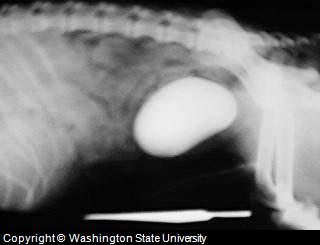A Urinary Track Infection and other urinary problems are somewhat common in dogs. The most probable cause of any problem is a bacterial infection that enters the body through the urethra, the same tube that carries urine outside of the body. Dogs that have a weakened immune system or other urinary problems may contract infections when the body is unable to adequately fight them off. It is also possible that a fungal infection takes hold if a dog is on steroids or antibiotics.
When bacteria colonizes or grows in number, it takes hold and then moves up the urinary tract to the bladder, possibly causing a dog bladder infection. Like all infections, one of the reactions in the body is inflammation of the urinary tract. Inflammation is actually a narrowing of the canine urinary tract, making it more difficult for urine to pass. This provides an opportunity for substances in the urine, such as minerals or crystals to bind together. This is how urinary tract and dog bladder stones are formed. If left untreated, the stones could lead to an obstruction or blockage of the tract, a very serious problem that needs immediate treatment by a veterinarian.
Contents
Canine Urinary Tract Infection Symptoms
As you can imagine, as inflammation sets it, it becomes more and more difficult for a dog to urinate. Classic symptoms of note are:
- Painful urination
- Difficulty when urinating
- Dog leaking urine
- Urination inside the house or in places that your dog shouldn’t go
- Urine smell
- Licking the urination area on the dog
Canine Urinary Tract Infection Treatment
Your veterinarian will look for the underlying cause of the dog urinary problems. A urinalysis is a test used to determine the composition and PH of the urine, and to check for the presence of blood. Minerals will be examined to see if the dog is at risk for bladder stones. Any causes of infection such as bacteria will also be noted as a result of this test.
If infection is found, then antibiotics will be prescribed. These types of medications are normally used for 10 to 14 days. In cases of severe canine urinary tract infection, the treatment period could be longer. At the end of treatment, dogs are retested to make sure that the infection has been cured.
Prevention of Canine Urinary Tract Infections
The one problem with conventional treatment is that it is a short term remedy. This means that although the problem is cured, the dog UTI problem may return unless changes are made in the way a dog is cared for.
The simple changes listed below can help to prevent future dog urinary tract problems. They include:
- Increase Water Consumption: Something as simple as water can help. One idea is to add an extra water bowl in another area of the home where your dog likes to rest. More exercise outside will also encourage urination, such as when marking the territory near your home.
- Try Cranberry Juice: Berry based juices have natural properties which can keep bacteria from clinging to the bladder walls. Add a bit to the morning bowl of water if your dog will tolerate the taste.
- Add Natural Dog UTI Remedies to the Diet : Natural remedies have a long history of helping both humans and dogs achieve better urinary health. They are not a cure, but a supportive approach meant to 1) help keep the urine PH in a normal range, 2) strengthen the body’s own immune defenses and 3) strengthen and soothe the urinary system.Ingredients selected for their positive impact on dog urinary tract and dog bladder health include:.# Berberis vulg (3X) – a widely used homeopathic remedy that is known for its positive effect on the bladder and urinary tract. This remedy also helps to support healthy immune system functioning. (Li SY, Ling LH, Teh BS, et al. “Anti-inflammatory and immunosuppressive properties of the bis- benzylisoquinolines: in vitro comparisons of tetrandrine and berbamine.” Int J Immunopharmacol 1989;11(4):395-401.)# Cantharis (6C) is often recommended for its ability to maintain a healthy flow of urine and soothe the bladder.# Staphysagris (6C) is a proven natural remedy also recommended for urogenital health and as a well known prostate tonic.
One product that combines these ingredients and that is manufactured by a highly reputable FDA registered company (U.S. Food and Drug Administration) is UTI Free. At the manufacturers site you can read more about natural remedies for canine urinary tract infections, read testimonials and see supporting clinical studies.
If the canine urinary tract infection problem continues to reoccur after trying these preventive approaches, see your veterinarian to determine any underlying cause that may be depressing your dog’s immune system.
To More Information on Dog Health
From Canine Urinary Tract Infection to Pet Health Guide Home Page



